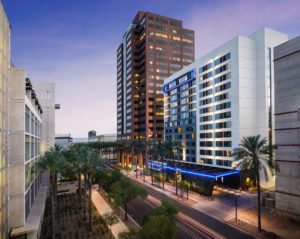CBRE is raising its forecast for hotel performance in the Phoenix metro and nationally on the heels of industry gains in Q4 2022 and the expectation of slightly positive GDP growth in 2023 according to the CBRE Hotels report.
In Phoenix, revenue per available room (RevPAR) in 2023 is expected to increase to $122.30, up 8.5% year-over-year and an increase of $2.45 from its previous forecast issued in November 2022. This is due to a 40-base-point (bps) increase from the previous forecast. The average daily rate (ADR) is expected to increase by 3.2% to $172.46 in 2023.
“The hotel market for the Phoenix metro continues to remain strong with increased demand supported by both leisure and corporate growth,” said CBRE’s Senior Vice President Adrienne Andrews. “In 2022, despite the first quarter occupancy and demand being impacted by omicron, the year ended with revenues that exceeded peak 2019 by over 18%.”
Similarly, on a national level, CBRE has revised its forecast for 2023 RevPAR to $97.46, up 5.8% year-over-year and an increase of $0.43 from its previous forecast. The positive revision is predicated on a roughly 30-bps increase in expected occupancy compared to the previous forecast in November 2022. There was no change to the ADR forecast of $150.21.
In 2024, CBRE forecasts Phoenix’s RevPAR to increase by 1% to $123.56. The company has also indicated that Phoenix’s ADR will increase by 1% to $174.22 in 2024 but at the same occupancy level (70.9%) as in 2023.
“In more dynamic times like today, market participants, including brands, investors and lenders, consistently look to markets like Phoenix for opportunities that will be relevant and supported for years to come,” added Andrews.
Nationally, CBRE’s baseline-scenario forecasts anticipate a 0.2% increase for full-year 2023 GDP growth and inflation of 4.7%. Given the strong correlation between GDP and RevPAR growth, changes in the economic outlook will have a direct impact on lodging industry results.
CBRE’s baseline-scenario forecasts do not contemplate an international war, a pervasive recession, or a more acute COVID variant. CBRE also produces forecasts based on upside and downside scenarios.
“The easing of travel restrictions in Japan and China, combined with continued improvements in group and independent business travel, should drive RevPAR to record levels in 2023 under our base-case scenario,” said Rachael Rothman, CBRE’s Head of Hotel Research & Data Analytics.
The U.S. economy grew at an annualized rate of 2.9% in Q4 2022, the second consecutive quarter of positive GDP growth. The uptick in economic growth led to Q4 record U.S. RevPAR of $89.27, up 16.2% year-over-year from Q4 2021. RevPAR growth was driven by a 12.1% increase in ADR and a 3.6% increase in occupancy year-over-year. Strength in the quarter was attributable to continued improvement in group business, inbound international travel, and an uptick in traditional transient business demand.
CBRE expects most 2023 RevPAR growth to occur early in the year, particularly in the first quarter. The new RevPAR forecast calls for 16.2% growth in Q1 2023, followed by increases in the 1.5% to 4.5% range over the balance of the year.
“Inflation continues to have a mixed impact on the hotel industry, bolstering top-line growth, while pressuring margins and increasing the cost of renovations and development,” said Michael Nhu, CBRE’s Global Hotels Economist. “The combination of inflationary pressures and higher interest rates are leading to slower hotel supply growth, and further strengthening the pricing power of existing hotels.”
CBRE forecasts that hotel supply will increase at a 1.0% compound annual growth rate over the next five years, below the industry’s 1.7% long-term historical average.
